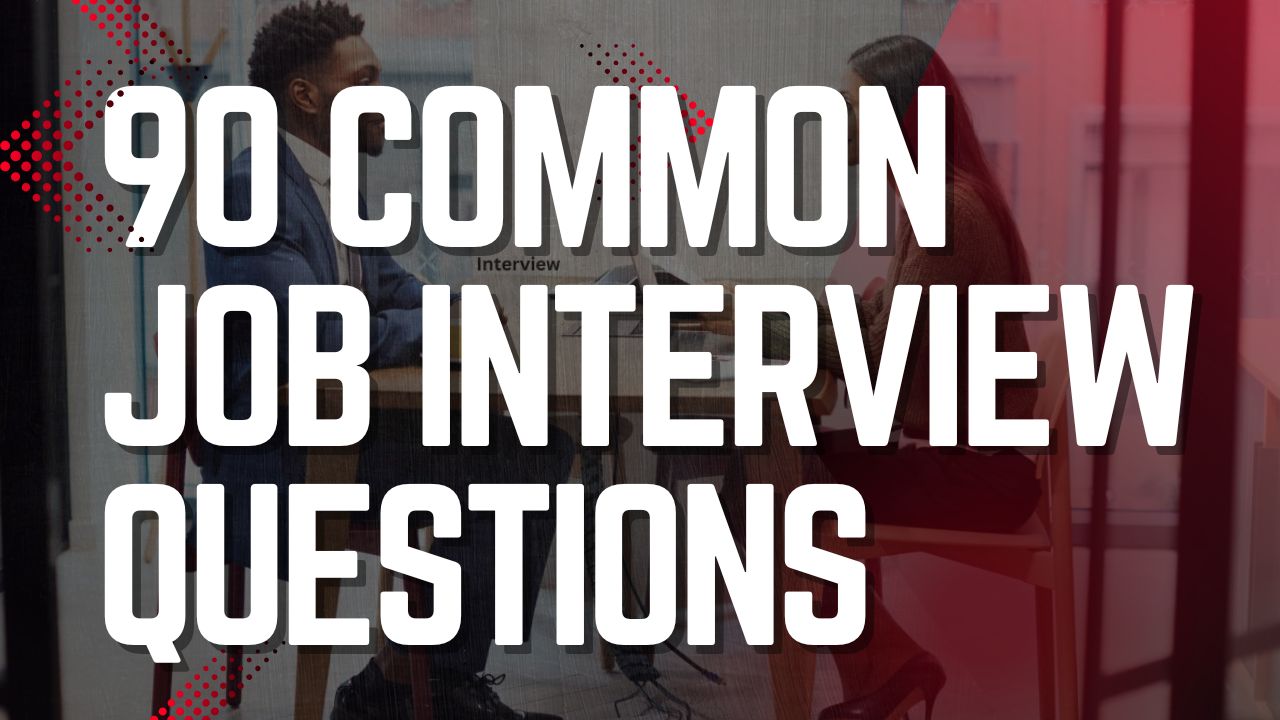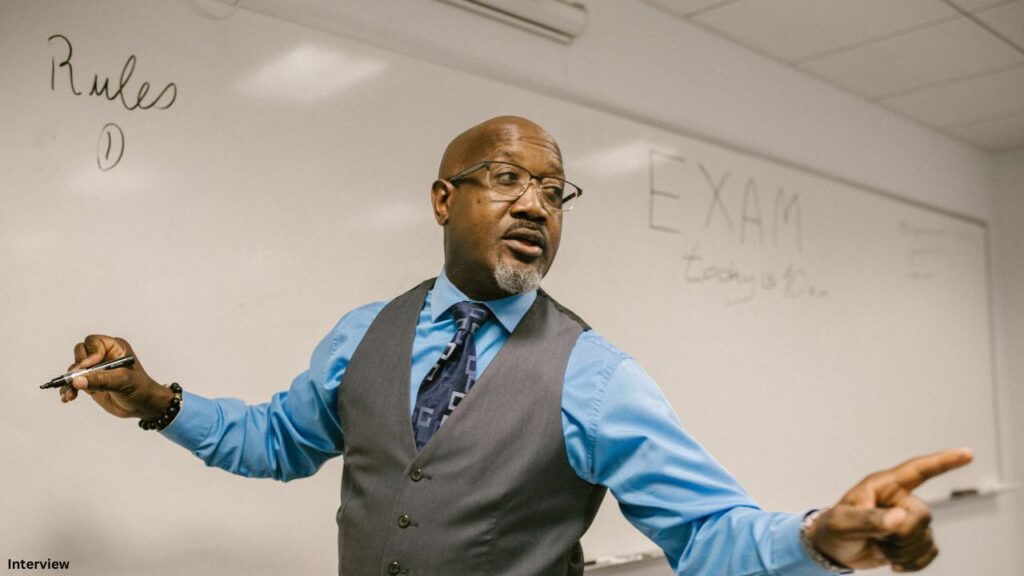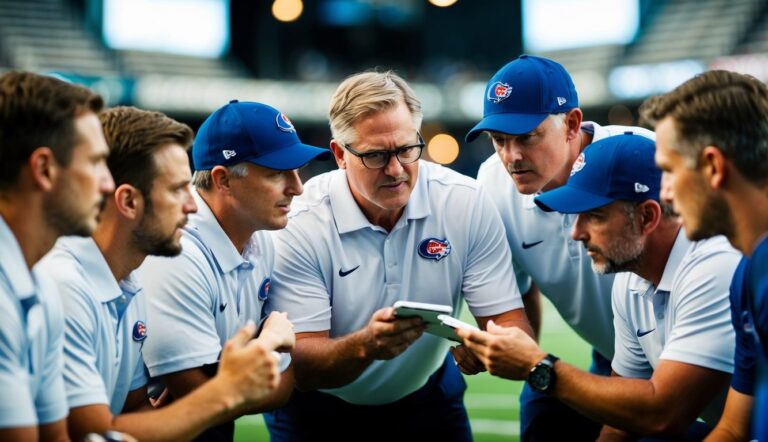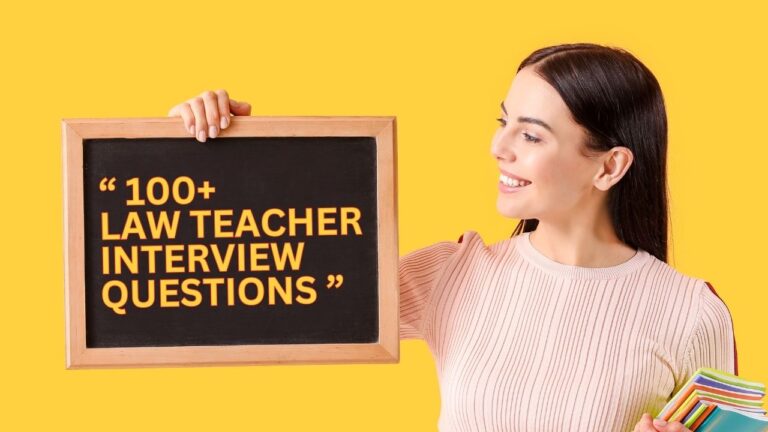90 Common Job Interview Questions: Essential Guide

Preparing for a job interview can be nerve-wracking. Many candidates find themselves wondering what questions might come their way and how to answer them effectively.
Being prepared for common job interview questions can make all the difference in landing the job. Knowing what to expect helps boost confidence and allows candidates to showcase their skills and experience clearly.

Interviewers often stick to a set of typical questions that reveal how well a candidate might fit into a role or company. Questions about strengths, weaknesses, and past experiences are common.
By reviewing these questions and preparing their answers, candidates can respond concisely and accurately. This preparation helps them stand out in a sea of applicants.
Understanding what interviewers are looking for in these questions can help anyone prepare better. Confidence often comes from thorough preparation, which alleviates some of the anxiety.
Understanding the Interview Structure

The interview process often follows a specific structure. Understanding this can help ease nerves and improve preparation.
Initial Stage: This usually starts with introductions and small talk. The interviewer might ask basic interview questions like, “Tell me about yourself” or “Why are you interested in this position?”
Main Stage: The focus moves to assessing skills and experiences. Behavioral interview questions will explore past situations, asking how one handled challenges. Examples include, “Describe a time when you had to solve a difficult problem.”
Situational Questions Stage: Here, interviewers present hypothetical scenarios. Situational interview questions test how a candidate might act in future situations. A common question could be, “What would you do if you had to meet a tight deadline?”
Closing Stage: This involves wrapping up the conversation. Interviewers may invite candidates to ask their own questions. It helps show interest and engagement.
Tips for Each Stage:
- Prepare for each type of question in advance.
- Focus on clear, concise answers.
- Use real examples during behavioral questions.
- Approach situational questions logically and step-by-step.
Recognizing each part of the interview helps candidates perform better and feel more at ease.
List of 90 Common Interview Questions
- Tell me about yourself.
- What are your greatest strengths?
- What are your weaknesses?
- Why do you want to work here?
- Describe your ideal work environment.
- How do you handle stress?
- What motivates you?
- Why should we hire you?
- What are your salary requirements?
- Describe a challenge you faced at work and how you dealt with it.
- What are your career goals?
- How do you prioritize tasks?
- Describe a time you worked in a team.
- Are you willing to travel for work?
- What is your greatest accomplishment?
- How do you handle criticism?
- Describe a typical work week for you.
- Why are you leaving your current job?
- How do you handle conflicts at work?
- What makes a team successful?
- Describe your work style.
- How do you adapt to change?
- What do you know about our company?
- Describe a time you failed.
- What are your hobbies?
- What is your management style?
- How do you set goals?
- How do you define success?
- What are your salary expectations?
- How do you manage your time?
- Describe a time you took initiative.
- What are you passionate about?
- How do you deal with difficult coworkers?
- When are you available to start?
- Describe your professional development activities.
- How do you stay organized?
- Explain a gap in your work history.
- What skills would you like to improve?
- Describe a decision you made in a crisis.
- What role do you usually play in a team?
- Describe a time you provided excellent customer service.
- What are your expectations from a supervisor?
- How do you handle tight deadlines?
- Describe a project you led.
- How do you approach learning a new skill?
- What do you value in a job?
- Describe a time when you disagreed with a decision.
- How do you keep up with industry trends?
- Can you describe your availability?
- Describe a time you motivated others.
- What is your approach to problem-solving?
- Describe a time you improved a process.
- What do you enjoy about your current job?
- Describe a time you handled multiple responsibilities.
- How do you approach work-life balance?
- What steps do you take to ensure quality?
- How do you handle ambiguity at work?
- What do you find most challenging about this work?
- Are you open to relocation?
- What role do innovation and creativity play in your work?
- Describe a successful team project.
- How do you evaluate success?
- Why are you interested in this industry?
- What makes you unique as a candidate?
- How do you prepare for meetings?
- What role does feedback play in your work?
- Describe how you handle repetitive tasks.
- What do you do if you run out of ideas for a project?
- What are your thoughts on remote work?
- How do you ensure effective communication?
- How do you handle a heavy workload?
- Describe an important decision you made at work.
- What inspired you to apply for this position?
- What software or tools do you use daily?
- How do you deal with competing priorities?
- What do you hope to achieve in your first month?
- How do you handle workplace stress?
- Describe a time you resolved a conflict.
- What are your thoughts on business travel?
- What skills make you a good fit for this job?
- Describe a time you exceeded expectations.
- How do you handle feedback you don’t agree with?
- What do you look for in a company culture?
- How do you prioritize team goals over personal ones?
- Describe a learning experience that had an impact on you.
- What part of your job do you find most rewarding?
- How do you address a mistake made at work?
- What would you like to improve in your workplace?
- How do you handle flexibility in your schedule?
- What lasting impact would you like to have in this role?
Self-Assessment and Personal Insight for Job Interview

Exploring personal strengths, understanding weaknesses, and focusing on career goals can help make a strong impression in job interviews. With insights into behavioral and situational questions, candidates can share their journey confidently.
Behavioral Questions
Behavioral questions explore past experiences to predict future performance. Interviewers commonly ask about strengths and weaknesses. Responding effectively requires reflecting on personal experiences.
Sample Questions:
- Tell me about a time you demonstrated leadership skills.
Answer: “In my last project, I led a team of five, ensuring deadlines were met, which resulted in a successful presentation.” - What is your greatest weakness, and how are you addressing it?
Answer: “I struggled with time management but have been using a calendar app to organize tasks efficiently.”
Situational Questions: Preparation Strategies
Situational questions present hypothetical scenarios. Candidates should explain how they would handle potential challenges based on past experiences.
Sample Questions:
- How would you handle a difficult client situation?
Answer: “I would first listen to their concerns, empathize, and then offer a solution that meets their needs.” - What steps would you take if you missed an important deadline?
Answer: “I would inform my manager immediately and create a plan to complete the task as soon as possible.”
Sharing Your Professional Achievements
Sharing achievements highlights a person’s capabilities. Interviewees should focus on concrete examples that showcase skills and experiences.
Sample Questions:
- Can you describe a professional achievement you are proud of?
Answer: “I spearheaded a marketing campaign that increased our social media engagement by 30%.” - Tell me about a time when you went above and beyond in your role.
Answer: “I initiated a new sales strategy that exceeded our quarterly targets by 25%.”
Describing Your Career and Professional Goals
Clear articulation of career goals shows motivation and direction. Candidates should align their aspirations with the company’s vision.
Sample Questions:
- What are your short-term and long-term career goals?
Answer: “Short-term, I aim to enhance my project management skills. Long-term, I aspire to lead a project management team.” - How do you plan to achieve your professional goals?
Answer: “By taking relevant courses and seeking mentorship opportunities to expand my expertise.”
Illustrating Your Motivation and Aspirations
Discussing motivations gives interviewers insight into what drives a candidate. It is important to share genuine enthusiasm for the role and industry.
Sample Questions:
- What motivates you to do a good job?
Answer: “The satisfaction of achieving personal and team goals while contributing to the company’s success.” - Where do you see yourself in five years?
Answer: “I see myself in a leadership role, developing innovative products that enhance customer satisfaction.”
Handling Challenging Questions

In job interviews, candidates often face questions about their past failures and problem-solving abilities. It’s important to address these topics honestly and clearly, showcasing how they’ve learned and grown from their experiences.
Responding to Questions About Failures and Mistakes
When interviewers ask about failures or mistakes, they often seek to understand how a candidate handles setbacks.
Describe a specific situation and what went wrong. Explain the task at hand and the actions you took to address the failure. Highlight what was learned and the positive outcome that followed.
For example, if discussing their biggest failure, a candidate might explain a project that did not meet expectations, the steps they took to rectify it, and how they improved their process as a result. Emphasizing self-awareness and growth can shift the focus from the mistake to personal development and resilience.
Problem-Solving in High-Pressure Scenarios
Handling problem-solving questions often requires showcasing adaptability and calm under pressure. Candidates should outline real-life examples where they successfully navigated a difficult situation.
Start by explaining the problem and why it was challenging. Describe the strategies used to tackle the issue, emphasizing analytical skills and creativity.
Candidates should include results to illustrate effectiveness. If faced with an unexpected deadline, explain how they prioritized tasks and the outcome. Highlight teamwork if others were involved. This can demonstrate the ability to thrive in collaborative environments.
Effective problem-solving examples reassure employers of a candidate’s capability to handle future challenges.
Frequently Asked Questions

When getting ready for a job interview, it is important to prepare for common questions. Understanding your career goals, motivation, and personal strengths and weaknesses can make a big difference.
Where do you see yourself in five years?
Interviewers ask this to determine if your goals align with the company’s future. It’s helpful to talk about your career aspirations and how they connect with the role you’re applying for.
Why do you want to work here?
Companies look for candidates who show genuine interest and knowledge about the company. Sharing specific reasons like the company culture or projects can show you’ve done your homework.
Why should we hire you over other candidates?
This question gives you a chance to highlight unique skills and experiences that set you apart. Focus on what makes you the best fit for the company and the role.
What are your biggest weaknesses?
Interviewers want to know how you handle and overcome challenges. It’s best to mention a real weakness but also how you’re working to improve it.
What’s your greatest professional achievement?
Discussing a past success can illustrate your skills and experiences. Use specific examples that demonstrate your impact and contributions in previous roles.
All the Best !






